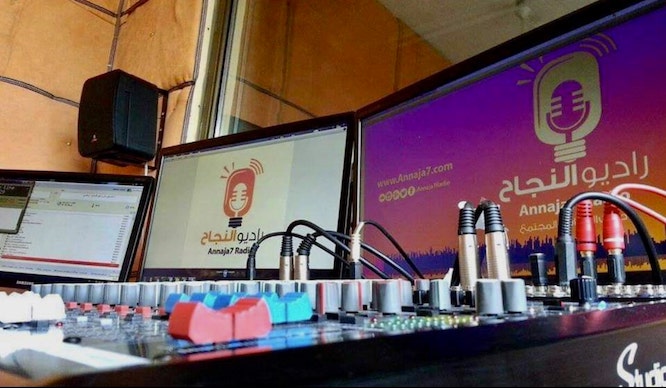
In the realm of contemporary literature, the coordinator of the initiative, Abdullah Al Jbour’s encounter with Amin Maalouf’s book ‘Deadly Identities’ sparked a revelation. The enduring relevance of this work today to the intricate web of identities and political intricacies shaping the Arab region remains undeniable. The book, published in 1998 regarding the fragmentation and identity politics following the long-lived civil war in Lebanon, shows that identities in the Arab region are still deadly and more dangerously ambiguous. Maalouf's exploration of fragmented identities and the ensuing identity politics resonates strongly even today, emphasizing that identities in the Arab region remain both complex and potentially volatile.
Driven by a vision of harmonious coexistence, Abdullah embarked on a remarkable journey. Leveraging his roles as a writer and researcher at Jordan's Citizenship Center, as well as a Consultant for Annaja7 Radio in Jordan, he envisioned a powerful medium to address these complexities - a podcast.
Abdullah astutely observed that “the politics of identity is dominating, and in fact, polarizing people”. Reflecting on an Arab film directed by the renowned Nadine Labaki, he posed a poignant question: "Where do we go from here?" He clarifies that “we are tangled into our religious and ethnic identities to the point where we sometimes do not see a way forward for living together”, which obscures the path toward peaceful coexistence.
The Podcast as a Cornerstone for Harmony
This visionary podcast, borne out of a collaborative effort between the International Dialogue Centre-KAICIID, Annaja7 Radio, and the Citizenship Center, emerged as the 'Identity Podcast: Diversity Dialogue in the Arab Region.' Comprising ten meticulously curated episodes, it served as a homage to the multifaceted identities within the Arab region.
In total, 10 radio episodes were produced and aired: https://linktr.ee/identity.podcast
Across these ten episodes, a virtual space for learning and understanding was meticulously crafted. It shone a spotlight on the religious and cultural affiliations that shape the Arab region. From the Amazigh [Kel Tamasheq] in the Maghreb region to the Sabians, Circassians, Baha'is, Shia Muslims, and the Yazidi community, the podcast explored a rich tapestry. Moreover, it delved into the unique, diverse communities residing in Lebanon, Iraq, and Syria.
Each episode welcomed experts and thought leaders to the virtual stage. Through insightful conversations, they meticulously dismantled misconceptions and prejudices, not just for the sake of knowledge but to set the record straight.
From the very first episode, where the narratives of Iraq's Sabian community were unveiled, Abdullah's unwavering dedication was palpable. The podcast's mission was clear: to enlighten, educate, and rectify.
Abdullah emphasizes that "the podcast is a significant stride forward, but it must be followed by other initiatives to maintain momentum."
The Power of the Digital World
The impact of these narratives extended far beyond audio waves. The podcast harnessed the formidable reach of social media platforms.
As Abdullah put it, "It was not just a podcast; it was a movement." It became a bridge fostering understanding among diverse cultural and religious minorities.
Annaja7 Radio's vision transcended the confines of the podcast. It aimed not only to correct misconceptions but also to reshape media narratives at large. The partner believes that initiatives like this are crucial for other media outlets, as they equip them with a deeper understanding of various religious and ethnic groups, adding nuance to their reporting. Initiatives like this make it difficult for media outlets not to adhere to objectivity.
Abdullah notes that "hate speech or stereotyping happens daily in the media, often unintentionally." He asserts that by fostering comprehension of diverse ethnic groups, the podcast raised the bar for responsible reporting, making it challenging for media outlets to unwittingly perpetuate biases.
Addressing such issues in the digital sphere is paramount, as Abdullah underscores. Many instances of ethnic violence originate in the digital realm before spilling over into the physical world. Abdullah contends that most ethnic violence today originates on social media and subsequently escalates to the streets.
While impactful, the podcast serves as a prologue. The ethnic and religious tapestry of the Arab region is intricate and extensive, warranting future seasons and episodes to fully illuminate it.
The Identity Podcast: A Testament to Dialogue 360 Project's Mission
The Identity Podcast stands as a testament to the mission of the Dialogue 360 Project, launched in 2020 to strengthen local dialogues as pillars of peace. In an era where divisions can escalate rapidly, Abdullah's creation showcases the potent role of storytelling in fostering reconciliation.
Through the podcast, Annaja7 Radio accomplished what many aspire to achieve: bridging divides, dispelling ignorance, and cultivating understanding. This story remains an enduring source of inspiration, a testament to the transformative power of communication and the media, and a beacon of hope for a more harmonious future in the Arab region.